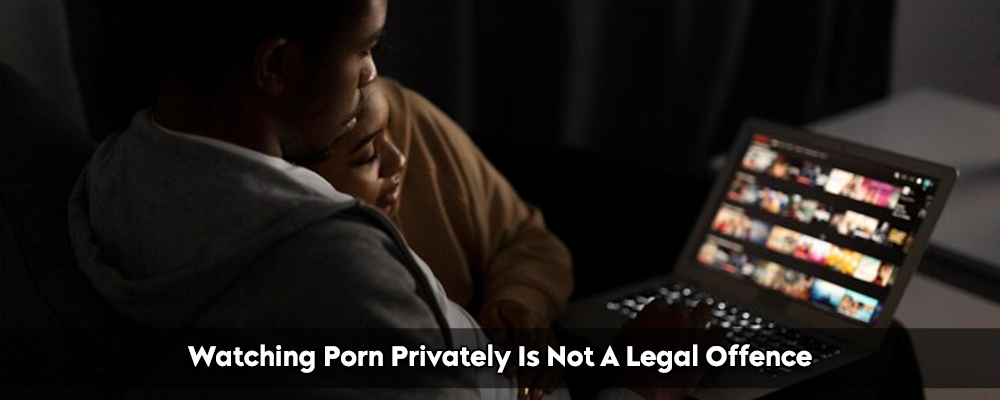Watching pornographic content in the privacy of your rooms or space shall not be deemed to be illegal in India. Article 21 of the Constitution ensures the right to life and personal liberty to Indian Citizens. In the year 2015, the Supreme Court of India remarked that watching porn in the privacy of a room would fall under the right to personal liberty as has been provided under the Constitution. Therefore, this right cannot be taken away by any authority, except for a procedure established by Law.
Need A Legal Advice
The internet is not a lawyer and neither are you. Talk to a real lawyer about your legal issue

Porn Banned in India
It shall be kept in notice that Fundamental Rights are not absolute in nature. Each fundamental right comes with certain reasonable restrictions. ‘Morality and decency’ are grounds on which the exercise of fundamental rights of a person is restricted. And based on these grounds only, the government had planned to ban pornographic content in the year 2015 which was unsuccessful, thus banning it again in the year 2018.
Use of pornographic media is a criminal offence in a few conditions, which have been provided by the law-
The Indian Penal Code,1860
Provided under Sections 292 and 293, it is illegal to sell, distribute, exhibit or even circulate obscene material. The Amendment introduced in the year 2013, included section 354 D to the IPC, 1860, which deals with stalking. After the Nirbhaya Case, certain amendments were introduced to the IPC which included Section 354D as well, providing that, “monitoring a woman’s use of the internet, email or any other type of communication” would be under section 354D(b). Hence, collecting photos of ladies from their social media accounts could result in a sentence of up to three years in prison.
The Information Technology (IT) Act of 2000
Section 66 F of the Act provides that, ‘transmitting photos of the private part of an individual without his or her consent’ would amount to a punishable offence with 3 years imprisonment or fine of not exceeding the amount of Rs 2 lakh or both.
While deciding the case of Justice K.S. Puttaswamy (retd.) and Anr v U.O.I. and Ors (2018), the Court observed that the right to privacy is a basic right provided under the Right To Life in Part III of the Constitution.
Section 67 of the Act of 2000 provides for the publication or transmission of obscene material which are described as, “any material which is lascivious or appeals to the prurient interest or if its effect is such as to tend to deprave and corrupt persons”, the guilty party would be punished for a period from three to five years in jail, as well as a fine up to 10 lakh rupees.
Section 67 A is applied in a situation where publishing or sending any other material depicting sexually explicit acts or conduct, which would be punishable up to a period of five years in jail with fine up to Rs.10 lakh. Recently, Section 67A was applied in the Boys Locker Room Event.
The Protection of Children from Sexual Offences Act (POCSO), 2012
The Act deals with the protection of the right of children and to prevent the events of child sexual abuse and exploitation. Chapter III of POCSO deals with the use of minors for pornographic purposes. Having minors for pornographic purposes is a punishable act under Section 14(1) of the Act with an imprisonment for a term of five years in jail as well as a fine.
Women’s Indecent Representation (Prohibition) Act of 1986 (IRWA)
The Act of 1986 prohibits the representation of women in ads, publications, writings, paintings, figures, and any other form in an indecent manner.
Judgement by the Kerala High Court- whether watching porn- photos or videos is an offence under the law
In the case criminal proceedings were initiated against a man as he was watching pornographic material at the roadside on his phone, these proceedings were later quashed by the Kerala High Court.
The Court observed that “privately” watching obscene pictures or videos on one’s phone without publicly exhibiting them or disturbing others will not attract the offence of obscenity as has been provided under Section 292 of the Indian Penal Code (IPC).
Section 292 of the IPC prohibits any sale, distribution, exhibition, or possession of any obscene object or material which is lascivious in nature or is likely to corrupt and deprive people. Committing such an act shall be punishable with an imprisonment for a period of 2 years as well as fine in case of first conviction and imprisonment for a period of five years and a higher amount of fine for all subsequent convictions.
It was observed by the court that watching pornographic content will be an individual’s private choice and his privacy shall not be intruded.
Lead India offers you a wide pool of experienced advocates who shall offer you assistance and necessary advice for matters involving both civil as well as criminal law, as required in your case. Hence, if you wish to talk to a lawyer or seek free legal advice online, you may contact us.





 Talk to a Lawyer
Talk to a Lawyer